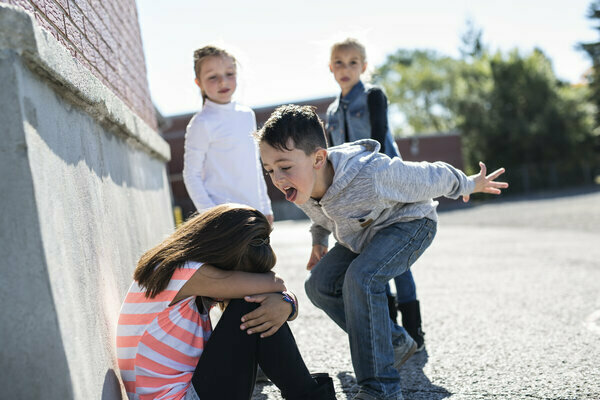
Verbal aggression, also called verbal abuse is a type of violence that is characterized because it seeks to harm another person with a hurtful message or speech.
It can manifest itself in the form of insults or disqualifying words, and the victim, as a consequence of these verbal attacks, may suffer anxiety, low self-esteem or a deterioration in their reputation.
Verbal abuse, a form of mistreatment
AND Abuse is usually associated with physical damage, which is much more visible when the physical consequences of said violent action can be seen. But there is a form of abuse that is more discreet: verbal abuse.
This type of violence is not always easy to identify since it is possible to normalize it and, under certain forms of expression, it can even go unnoticed when the abuser comes to justify it with blackmail.
And this type of violence produces psychological pain, which is much less visible than the physical, but more lasting and devastating. There are many people who attend psychotherapy sessions due to a situation of psychological and emotional abuse. If you think you are also suffering from it, you can read this article: “The 30 signs of psychological abuse in a relationship” and answer the questions raised in it.
The profile of the psychological abuser: what are these types of people like?
The truth is that verbal abuse and psychological mistreatment, Although they are less visible, they occur quite frequently and in different environments: work (mobbing), partner, school (bullying)…
However, not everyone intends to harm the people around them. People who psychologically abuse others usually have a series of characteristic traits. They are the following:
You can delve deeper into these traits and others in our article: “Profile of the psychological abuser: 21 traits in common”
Things you should know about verbal aggression
Verbal aggression It is a serious problem that must be detected as soon as possible, because the damage that the victim can suffer can be very destructive. Below you can find a list of things you should know about verbal aggression.
1. Causes low self-esteem and inferiority complex
It may seem that a few simple words do no harm, but Repeated verbal abuse can cause serious emotional and psychological problems for the victim When someone constantly repeats to another person that it is their fault, that they do everything wrong, that they are worthless, etc., in the end one ends up believing it and ends up internalizing it.
The result of this is that the person ends up suffering an inferiority complex and low self-esteem, because much of how we evaluate ourselves depends on the opinion that others have of us.
2. The circuit of emotional and physical damage is the same
According to Eric Jaffe, in his book Why Love Literally Hurtsneuroimaging studies have shown that regions involved in physical pain processing overlap with those related to emotional pain and social distress
This is consistent with experiments carried out by Naomi L. Eisenberger and other researchers, who have shown that the same brain regions are activated both for physical pain and when someone feels socially excluded, which could be very worrying in terms of the implications it has about the importance of emotional pain. While physical pain may produce acute but short-lived pain, emotional pain lasts longer and can manifest repeatedly over time.
3. Consequences on the person’s physical health
Unfortunately, this type of behavior could lead the victim to a situation of sadness and depression which, in turn, could be detrimental to their physical health. This is because this negative state, if prolonged, leads the victim to carry out certain toxic habits to fill your emptiness (for example, poor diet, isolating yourself or not doing physical exercise).
Suffering from this type of abuse in the early stages affects a person’s growth in many ways, for example, the development of bones, muscles and vital organs also deteriorates. The child becomes weaker and weaker as time goes by.
4. Development of antisocial and criminal behavior
Especially when repeated verbal violence occurs against the little ones, the emotional impact accompanies them for the rest of their lives. One of the worst side effects in abused children is that in many cases they develop forms of antisocial behavior
Several studies carried out on the childhood of criminals have established links between verbal abuse and the criminal history of individuals. In a certain sense, verbal abuse is in itself a violent behavior of a symbolic nature, and its first-person experience makes young people begin to get used to aggression in general, so if they start doing the same thing it does not seem so serious. Children, to some extent, imitate what they see, and often take it further in part to experiment.
5. Changes in the brain
It seems that the damage not only occurs at a behavioral level, but that the brain also suffers the consequences of verbal abuse. This is what a study by Martin Teicher and his colleagues found, stating that a hostile and stressful environment (such as a family that engages in repeated verbally abusive behaviors with their children) causes significant changes in some brain regions of the people who are victims of these acts.
Among the affected areas is: the corpus callosum, responsible for transferring motor, sensory and cognitive information between the two cerebral hemispheres; the limbic system, a region that regulates emotions; and the frontal cortex, responsible for reasoning, executive functions and decision making.
Likewise, there appears to be a correlation between verbal abuse and changes in the gray matter of the brain (without proving causality), according to research by Akemi Tomoda and other researchers. If the abuse becomes chronic, it is expected to produce more or less detectable changes in the brain.
6. The effects of verbal aggression are greater than the expression of love
If love is a very strong feeling that can change our behavior, it seems that verbal aggression affects us even more intensely. That is why we must be especially careful when educating our children.
Research states that If parents humiliate and reject their children, the children may never overcome the damage as adults that they caused. Hurtful words have a strong impact on children’s emotional health. So you have to be careful with the things you say. The fact of having suffered humiliation and ridicule is capable of leaving a mark on self-image and self-esteem, a mark that in the long term leads to rejection behaviors directed outwards, towards others.








